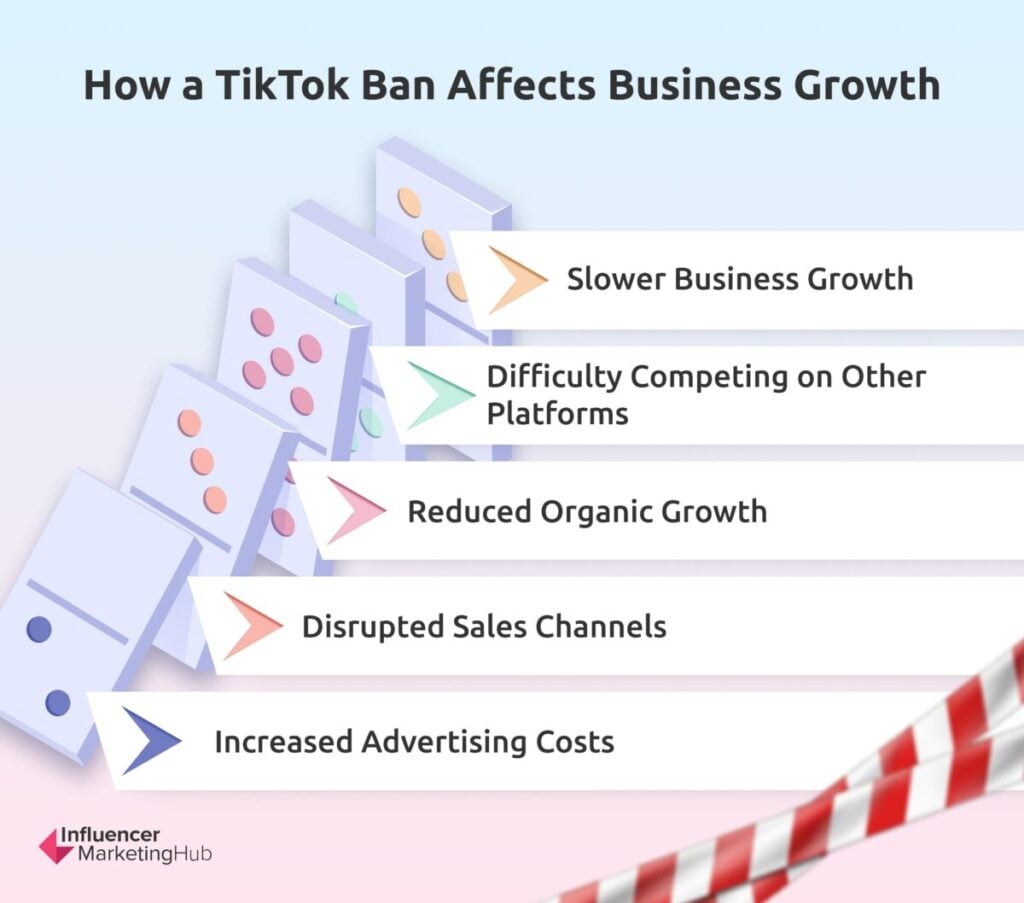With the clock ticking down to a potential nationwide TikTok ban, millions of users, businesses, and influencers are grappling with what could be a seismic shift in the digital landscape. The platform, with over 1.5 billion active monthly users, has become a cornerstone for content creation and brand marketing. Now, the social media platform faces the threat of being completely removed from app stores across the U.S.
This looming ban isn’t just about an app; it’s about the livelihoods and strategies tied to its success.
For influencers, it could mean losing their primary source of income and engagement. For businesses, it threatens to cut off a vital advertising and e-commerce channel. As the deadline approaches, it’s crucial to understand the ripple effects this decision could have and what steps can be taken to adapt.
How a Ban on TikTok Could Affect Influencers
A TikTok ban would represent a significant shift for influencers and creators who depend on the platform to reach their audiences and generate income.
For many creators, TikTok isn’t just a platform for expression—it’s a livelihood. Social media influencers like Sandra Macedo (@ryderthedal), a pet creator with 164,000 followers, would face significant financial setbacks if a ban were enacted. Speaking to Forbes, Macedo explained that:
“As a full-time content creator, this ban will greatly affect my income from brand deals, the Creator Fund, and the traffic sent to our Amazon Storefront,”
Others, like Stepz (@realstepz), a breakout music artist, credit TikTok with launching their careers. Stepz emphasized that TikTok has given young artists a platform to showcase unique talents, saying,
“[Without TikTok] kids that actually have talent might lose their sound and voice.”
For less-privileged creators, a ban could mean losing access to opportunities that would otherwise remain out of reach.
TikTok’s algorithm is renowned for fostering audience engagement, even for niche creators. Monique (@skinfiltrator), a skin-care influencer, noted that TikTok’s “algorithm doesn’t discriminate,” allowing her to connect with audiences who might otherwise be difficult to reach.
Considering that TikTok has become an essential platform for creators and influencers, an outright ban could affect them in a number of ways:
- Loss of Income Streams: Many creators rely heavily on revenue from TikTok’s Creator Fund, brand deals, and affiliate links. Our TikTok Marketing Report found that 51.9% of surveyed users are actively selling through TikTok Shop. A ban could significantly disrupt these income sources, leading to immediate financial challenges.
- Decreased Audience Engagement: TikTok’s algorithm is renowned for connecting creators with niche audiences, especially Gen Z users. Losing this advantage would make it harder for creators to maintain their current level of visibility and engagement.
- Increased Effort to Transition: Moving to platforms like Instagram or YouTube would require creators to invest significant time and resources. These platforms might not provide the same organic reach, making the transition more challenging.
- Uncertain Career Trajectory: For creators who built their careers leveraging TikTok’s discoverability, the ban could mean a complete reevaluation of their digital strategies to adapt to the rapidly changing landscape.
How Would a TikTok Ban Impact Businesses?
TikTok has revolutionized small business advertising, providing brands with direct and cost-effective access to millions of users. This platform has been especially valuable for startups and small enterprises seeking to grow without large advertising budgets.
As Andrea Sager, founder of Legalpreneur, explained,
“Right now TikTok is one of the main ways we’re bringing in clients. It’s why our acquisition costs remain so low.”
@thelegalpreneurHow do you protect your business name?♬ original sound – Legalpreneur
Without TikTok, businesses like Legalpreneur would lose a critical and affordable pipeline for attracting new customers.
Small businesses, in particular, have thrived on TikTok’s e-commerce tools and organic reach, which help them connect with audiences in ways other platforms struggle to replicate.
For instance, during Black Friday alone, U.S. shoppers spent over $100 million on TikTok, underscoring its effectiveness in driving sales. Entrepreneurs like Megan Druckman, founder of pre-owned luxury handbag company Lola Saratoga, have leveraged the platform to propel their brands forward.
Druckman highlighted this, saying,
“TikTok has propelled our women-owned business into the spotlight thanks to the platform’s remarkable opportunities.”
If TikTok were banned, businesses like these would face the daunting challenge of replacing this exposure and finding alternative ways to engage their audiences. The loss of TikTok’s unique advertising ecosystem would force many to reevaluate their strategies and adapt to a shifting digital landscape.
Without TikTok, businesses could experience:

- Increased Advertising Costs: Many small businesses rely on TikTok for its low-cost customer acquisition. A ban would force them to invest in pricier alternatives, cutting into their budgets.
- Disrupted Sales Channels: TikTok’s e-commerce integration allows for seamless product promotion and sales. Losing this channel would significantly impact businesses, especially during peak shopping seasons like Black Friday and Cyber Monday, especially considering that a third of all TikTok users shop in-app.
- Reduced Organic Growth: TikTok’s algorithm is a game-changer for reaching audiences organically. Without it, small businesses would struggle to replicate the same reach and engagement elsewhere. Further adding to these claims is that every 1 in 4 TikTok users is not present on any other social platforms.
- Difficulty Competing on Other Platforms: Transitioning to platforms like Instagram or YouTube may require additional effort and resources, leaving smaller brands at a disadvantage compared to larger competitors.
- Slower Business Growth: TikTok’s unique ecosystem has allowed many startups and small enterprises to scale quickly. In 2023, small businesses generated nearly $15 billion in combined revenue through TikTok, highlighting the platform’s substantial economic impact. A ban would likely result in slower growth and fewer opportunities for these businesses to thrive.
Adapting In Case the TikTok Ban Goes Through
The potential TikTok ban in the US could follow a similar trajectory to the ban in India, where users were given just a day’s notice before the platform was permanently removed. This abrupt announcement left influencers and businesses scrambling to notify their followers and redirect their audiences to other platforms.
If a ban were to go through in the US, it’s likely that users might face a similarly brief timeline, highlighting the critical need for proactive planning to ensure continuity of their content and revenue streams.
It requires creators and brands to consider strategies that go beyond a reliance on any single platform. Key ways to adapt to a TikTok ban include:
- Expanding Your Social Media Footprint: Start actively building a presence on platforms like Instagram Reels, YouTube Shorts, and Snapchat Spotlight. Cross-promote your content to encourage followers to connect with you on multiple channels.
- Leveraging Owned Media Channels: Create email newsletters, blogs, or private communities where you can directly interact with your audience. Encourage followers to subscribe, ensuring you maintain access to them regardless of platform changes.
- Embrace Data-Driven Marketing: Invest in SEO, PPC (pay-per-click) campaigns, and retargeting ads to expand your reach. These strategies can help you attract and retain customers outside of social media.
- Test New Formats on Different Platforms: Experiment with content on emerging platforms or formats that align with your audience’s preferences. For example, Pinterest Idea Pins or LinkedIn video ads could offer unique opportunities.
Final Thoughts
A TikTok ban would ripple across industries, from influencers to small businesses, forcing them to adapt quickly. As TikTok’s legal battles continue, one thing is certain: digital marketing is evolving, and adaptability will be the ultimate measure of success.
